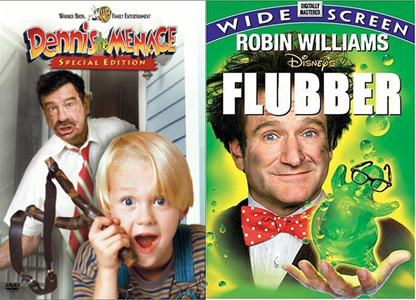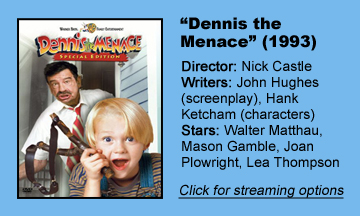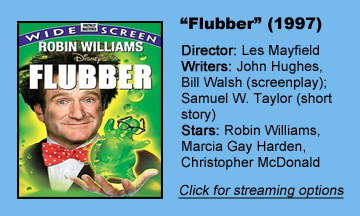When committing to do a series reviewing every entry in a writer’s catalog, I know there are gonna be some duds to slog through, and I was fearing “Dennis the Menace” (1993) and “Flubber” (1997) in my John Hughes project.
Of these two reworkings of midcentury properties – the 1951 comic strip (which was also a TV series) and the 1961 movie “The Absent-Minded Professor” — at least one of them is not too annoying, but it’s not the one I would’ve guessed.
“Dennis the Menace” (1993)
Can’t quibble with the casting
Firstly in its favor, “Dennis the Menace” is perfectly cast, as director Nick Castle and his team find actors who look like Hank Ketcham’s drawings and can also act.
Walter Matthau plays Mr. Wilson in a nicely restrained way wherein he’s not any more irked by Dennis (a surprisingly not-detestable Mason Gamble) than anyone else would be. He doesn’t run around screaming and cursing. Joan Plowright’s Mrs. Wilson is an appealing stereotype of a nice older woman.
Lea Thompson and Robert Stanton are Mr. and Mrs. Mitchell, who go on business trips and have to leave their son with the Wilsons after being shut out by letters A through V in their black book of babysitters.
“Dennis” starts so slowly I almost turned it off – Hughes Day Tuesday project be “G.D.’d” (as Mr. Wilson would say).
But all the subsequent set-ups are better than the bland first one wherein Dennis shoots an aspirin into Wilson’s mouth with a slingshot, and the second one wherein Dennis and his pals work on their tree fort and theorize about where babies come from.
(They are inserted by doctors and priests via the mother’s belly button, Dennis tells Martha and Joey with authority.)
‘Home Alone’ discards?
Hughes backloads his best material, including some decent bathroom humor. There’s definitely a sense that he’s using “Home Alone” discards, for better or worse.
Calling to mind the older brother in “Home Alone,” Devin Ratray is good in a brief turn as Mickey, the barely literate teenage boyfriend of babysitter Polly (a pre-“American Pie” Natasha Lyonne). It’s amusing to see Mickey try to sound out words from “Thomas the Tank Engine.”
A fair number of pratfalls are at Mr. Wilson’s expense, and they of course come from Dennis being curious but careless in the manner of a little kid.
But throughout the picture, Hughes and Castle pepper in Christopher Lloyd’s robber Switchblade Sam, a filthy and nasty drifter who becomes the target of Dennis’ accidental physical punishment in the final act. Kids will probably find him scary.
For adults, there’s a bit of nostalgia with the suburban, manicured block where kids play hide-and-seek as the sun sets. Although set in 1993, the neighborhood is effectively timeless.
“Dennis’ ” problem is that it’s not funny enough; only a few bits of physical comedy connect. Matthau deserves tons of credit for selling all the pratfall humor, including multiple occasions where Wilson is hit in the balls and gives a silent grimace of pain.

Granted, I am not the target audience for “Dennis the Menace.” I didn’t have a blast watching it, but my expectations were so low that I’m happy to say it’s a less painful experience than what Mr. Wilson endures.
2.5 stars
“Flubber'” (1997)
A safe bet gone wrong
“Flubber,” though, is a cinematic kick in the crotch, which is disappointing because Hughes and director Les Mayfield had previously teamed up for 1994’s lovable “Miracle on 34th Street” remake.
This seems like a safe bet, too, but “Flubber” squanders Robin Williams and cutting-edge special effects with an oddly grim and flat screenplay from Hughes (modernizing Bill Walsh’s “Absent-Minded Professor”), and inappropriately dark cinematography (perhaps necessary in the early age of digital effects).
Rather than clever gags or insights into human nature, the most Hughesian aspect of “Flubber” is low-level henchmen (Ted Levine and Clancy Brown) getting repeatedly nailed with flubber-enhanced golf balls and bowling balls. Violent Hughesian slapstick has never been less appealing, playing as lazy and nasty here.
Granted, “Flubber” sets itself apart from reality out of the gates when college professor Philip Brainard (Williams) misses his wedding to Dr. Sara Reynolds (Marcia Gay Harden) for the third time. This unintentionally paints the story’s hero in a negative light.
I think “Flubber” wants to be like Jim Carrey’s “The Mask,” and taken in isolation, Williams’ physical antics are mildly amusing, like when he tests out the spray-on flubber on his shoes and a basketball in an empty gym. But many sequences have a blocked-off, isolated coldness.
Some decent effects
An exception is the basketball game sequence, easily the highlight. Set aside the oddity of the weaker of the two college teams looking like a high school JV squad, and we can enjoy rapid-speed dribbling, leaps higher than the hanging scoreboard, and a good collection of dunks – plus the requisite befuddled reactions.
The conclusive showdown between the professor and the villains is also a decent stretch of physical comedy, with “Dutch’s” Christopher McDonald – as always, playing a slimeball (and not the green, bouncy kind) – getting to play out the effects of a wad of flubber moving through his digestive tract.
Yes, it completes the journey, which might delight younger viewers. It struck me as obvious (and I’m usually game for bathroom humor). Still, this gag comes closer to being smile-worthy than anything else that Hughes tosses off over the 90 minutes.
In addition to the titular globules, “Flubber” features a flying car and a hovering robot, Weebo (voiced by Jodi Benson), who has fallen in love with the professor. She sometimes communicates with a screen showing Disney clips – similar to how the Transformer uses radio songs in “Bumblebee.” But Weebo can talk, so the clips are obnoxious.
On paper, there is magic in “Flubber,” and from the strictly technical perspective of cinematic history, the special effects are good. But the film never achieves the bouncy energy of its titular invention. Hughes’ name is on “Flubber,” but his heart isn’t in it.
1.5 stars



